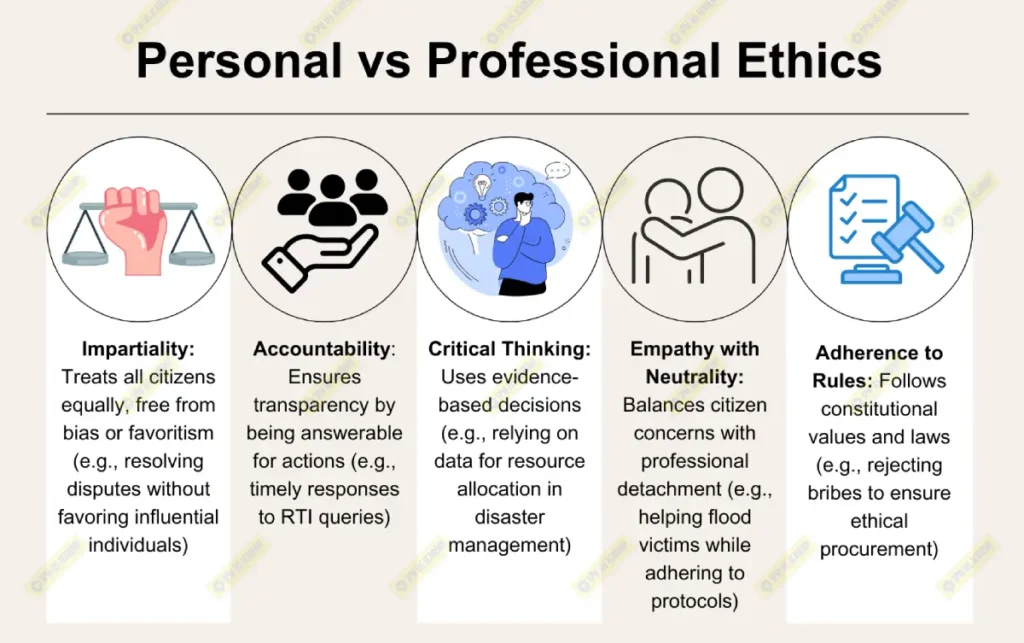Ethics guide behavior in both personal and professional spheres. Personal ethics stem from individual values and upbringing, while professional ethics are tied to role-specific responsibilities. For civil servants, whose actions directly impact public welfare, aligning personal and professional ethics is crucial.

Distinction Between Personal and Professional Ethics
- Personal Ethics: These refer to an individual’s moral principles that govern their behavior in private life. They are shaped by upbringing, culture, and personal beliefs, focusing on honesty, compassion, and integrity.
Example: A person may refuse to tell lies in personal interactions, even if it causes inconvenience. - Professional Ethics: These are standards and principles governing conduct in a workplace, specific to roles and responsibilities. They emphasize impartiality, accountability, and service to the public.
Example: A civil servant must ensure fair distribution of disaster relief, adhering to transparency and the law.
Interdependence of Personal and Professional Ethics
While personal and professional ethics are distinct, they are interdependent. A civil servant’s ability to uphold professional ethics often depends on their personal integrity and values. An ethical professional life cannot thrive in isolation if personal life contradicts those very principles.
Justification: Can a Civil Servant Be Ethical Professionally Without Personal Ethics?
It is not justified for a civil servant to compartmentalize ethics, being ethical in their professional duties while disregarding it in personal life. Here’s why:
- Integrity is Indivisible:
A lack of integrity in personal life undermines the credibility of professional behavior.
Example: If a civil servant takes bribes in personal dealings (e.g., accepting money for a personal favor), it erodes public trust, even if they appear impartial in official duties. - Impact on Public Perception:
Public servants are role models, and ethical lapses in personal life can damage public confidence in their governance.
Example: A civil servant advocating for gender equality at work but engaging in domestic violence damages both personal credibility and the institution’s image. - Conflict of Values:
Inconsistency between personal and professional ethics can lead to compromised decision-making and loss of moral clarity.
Example: A bureaucrat who evades taxes personally may find it difficult to enforce tax laws impartially at work. - Holistic Leadership:
Ethical leadership requires aligning personal and professional values, fostering trust and respect in both spheres.
Example: E. Sreedharan, the “Metro Man,” upheld integrity in both his professional and personal life, becoming a symbol of honest leadership.
Personal and professional ethics are intertwined, with the former forming the foundation for the latter. It is unjustifiable for a civil servant to disregard personal ethics while claiming professionalism, as this disconnect undermines public trust and weakens governance. As Mahatma Gandhi said, “You cannot divide life into compartments. The personal and the professional must converge into one seamless whole of honesty and integrity.” A civil servant must embody ethical principles in all aspects of life to truly serve as a custodian of public trust.











